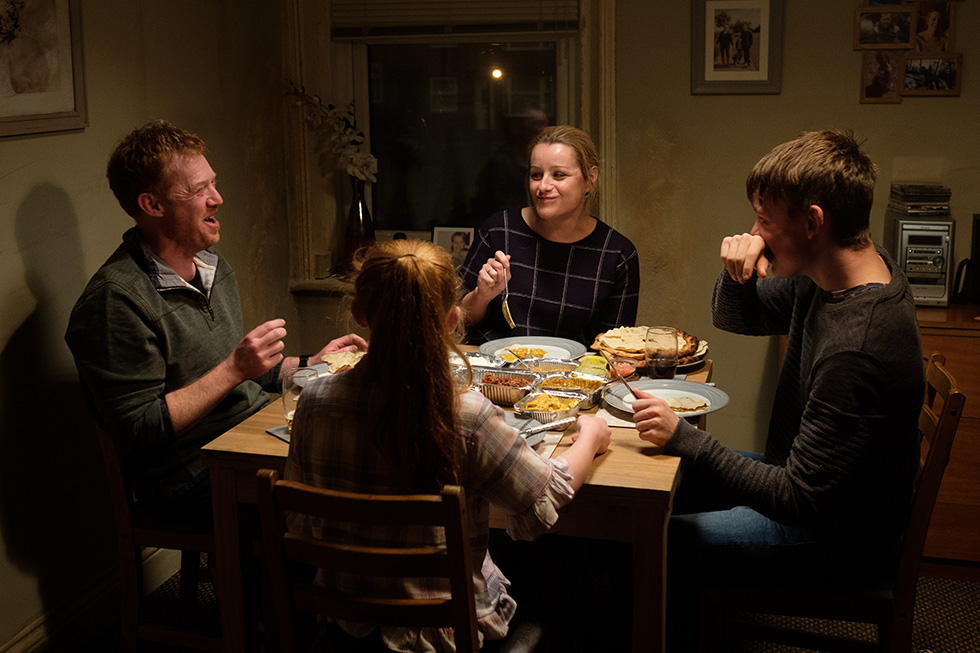“A New Type of Exploitation.” Ken Loach’s Sorry We Missed You – Reviewed

As evidenced by his latest outing Sorry We Missed You, director Ken Loach has lost none of his instinct for urgent, humane cinema, finds Mike Pinnington…
Come the closing scene of Ken Loach’s latest film, Sorry We Missed You, the audience had gone through the wringer so completely that something approaching comradeship hung about us in the air; as we shuffled out of the screening, we glanced at each other, sharing knowing looks. We had heard each other gasp, groan with resignation and sob, as we followed the all too inevitable – and believable – travails of the Turner family, who lurched powerlessly from one crisis to another.
The film – a no-holds-barred take down of zero-hours contracts and the gig economy – might never have happened but for Loach’s preparations for celebrated previous release, I, Daniel Blake. “When we were going to the food banks for our research,” he explains, “many of the people that were coming in were working – part time, zero-hours contracts. This is a new type of exploitation. The so-called gig economy, the self-employed or agency workers, the casualised workforce just continued to feature in mine and [writer] Paul’s [Laverty] ongoing daily conversations.”
The family’s problems begin in present day north-east of England. They can be traced back to the 2008 financial crash when they – as with many others – lost their Northern Rock mortgage, and had to turn instead to renting, a treadmill they’ve been walking ever since. (Infamously, those responsible for the crash walked away, pretty much Scot-free.) Dad Ricky throws his lot in as a parcel delivery driver, renting a van to (ostensibly) work for himself – meanwhile bearing all the risk if things go wrong. To him, kidding himself perhaps, it’s just the break they need; with it, he can dig the family out of a hole and get everything back on track. Things, predictably, don’t quite play out like this. Ricky, played with convincing world-weariness by Kris Hitchen, is permaknackered from the word go. Adding to the recipe for coming disaster, they must sell the family car to cover the van’s deposit, meaning wife Abbie having to trek uphill and down dale on public transport in her job as a visiting care worker.
Their lives and those of their children quickly become defined by the constraints placed on them by debt and the daily grind. Small issues build and flashpoints multiply; and as their dominoes tumble, problems stack up – adolescent son Seb, perennially disappointed by his dad, starts to go off the rails. Skipping school for more care-free creative pursuits – graffitiing everything from public spaces to family photos – he eventually faces the consequences (in the form of suspension from school), becoming the picture of difficult father/son relationships boiling over. Wise and sensible younger sister Lisa Jane, meanwhile, internalises the family’s deepening problems that her parents find increasingly impossible to address, or hide. “Stop arguing,” she shouts at her mum and dad through the paper thin bedroom walls in one scene. Ultimately, she’ll play her own sadly misguided part in one of the film’s key plot points.
To explicate further here would risk giving the game away but suffice it to say that, sometimes, it’s sadly not enough for families to love each other – that love, fervent and strong though it may be, provides no protective shield against the unpredictable, unremitting nature of life on or near the bottom of the pile. In Sorry We Missed You, described by Loach as “not exactly a companion piece to Daniel Blake but a related film”, the veteran director depicts lives lived on the brink. There, the merest swipe of fate, hastily taken decision, seeming ‘bright’ idea or unhelpful gust of wind can nudge you and those you love over the edge, both figuratively and literally.
Many an audience’s experience of and response to the film will no doubt be emphasised by real life proximity to just such a precipice. Loach’s brand of social realism is never far from the lives and stories of those that inspire him. This is a director making difficult, urgent and humane cinema; cinema which bears witness to the underrepresented – people let down and exploited who, not so long ago, might reasonably have been able to expect a safety net rather than an uncaring shrug. Sorry We Missed You is unapologetically not a winter warmer, then. What it is, however, is vital and memorable cinema. Loach’s is an essential voice of and for our times.
Mike Pinnington
Sorry We Missed You is in cinemas now





